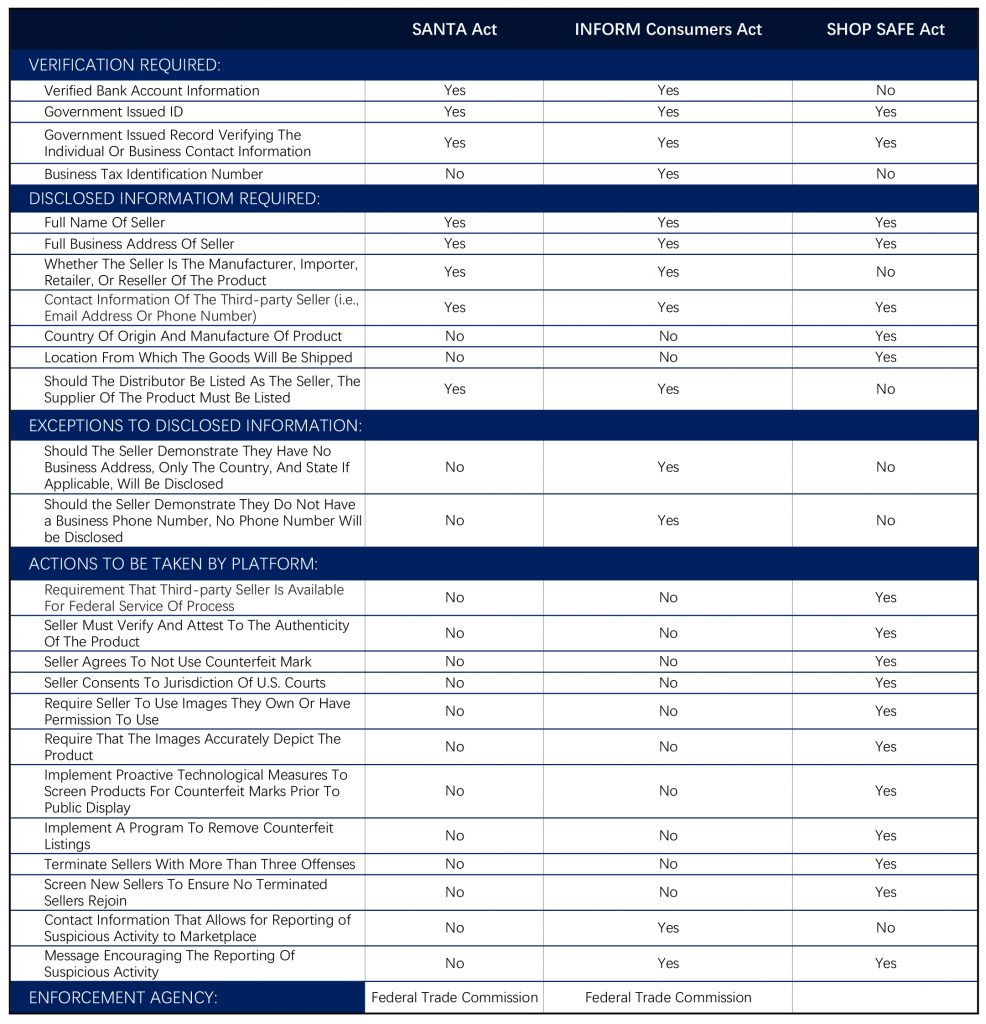John H. Zacharia
Founder, Zacharia Law PLLC
Kari Kammel
Assistant Director, Education and Outreach, Center for Anti-Counterfeiting and Product Protection, Michigan State University
When buying items directly from brand owners online, consumers get exactly what they expect: the real item. Historically online, consumers bought genuine items online directly from a brand owner or authorized vendor. Today, however, third-party sellers have taken a larger share of the e-commerce retail pie. For example, more than half of Amazon’s revenue now comes from third-party sellers. Although this shift has given e-commerce platforms significantly increased revenue, the number of counterfeits sold has also dramatically increased on the most-visited e-commerce platforms – often with terrible consequences for consumers and brand owners alike. As a result, brand owners, consumers, and even the President of the United States have called on e-commerce platforms to do more to prevent third-party sellers from exploiting their platforms to sell counterfeit goods.
In this midst of these calls for action, Congress proposed three different bills this past year – the Stop All Nefarious Toys in America Act (SANTA Act), the Stopping Harmful Offers on Platforms by Screening Against Fakes in E-commerce Act of 2020 (SHOP SAFE Act of 2020), and the Integrity, Notification, and Fairness in Online Retail Marketplaces for Consumers Act (INFORM Consumers Act) – requiring e-commerce platforms to take preemptive steps to stop third-party sellers from selling counterfeit and illicit goods online. This article summarizes our broader, in depth white paper that more thoroughly analyzes how each bill proposes to tackle the e-commerce counterfeiting problem and evaluates how Congress can improve the three proposed Acts and harmonize them into a more effective, single act of law (read full article here).

Protecting Consumers from Third-Parties on E-Commerce
Through these bills, Congress seeks to protect consumers from third-parties intent on using e-commerce platforms to sell counterfeits just to make a quick buck, and to encourage e-commerce platforms to adopt business models that take pro-active steps to prevent counterfeits from ever being listed or sold on their platforms. Most significant, these bills require e-commerce platforms to take verification and due diligence steps before third-parties list or sell goods on their platforms. These bills show that after-the-fact, reactive business models that purport to combat counterfeiting, such as filing or joining a civil counterfeiting or trademark infringement case after the infringing product is listed or sold on the platforms, are no longer enough, nor do they protect consumers. Under these bills, if the platforms wish to avoid liability, then they must use their leverage proactively over third-party sellers before harmful counterfeits reach consumers. For these reasons, Congress’ efforts with these bills thus far should be commended.
Nevertheless, we recommend that Congress should harmonize its efforts into one bill and take the following steps:
1. Remove provisions that require e-commerce platforms to distinguish between certain types of goods or sales volume of third-party sellers – whether its toys vs. non-toys, goods that implicate health and safety vs. goods that do not, or high-volume vs. low-volume third-party sellers. Asking e-commerce platforms to make these distinctions invites litigation over how they make these decisions instead of taking the shortest path to each bill’s goal of keeping counterfeit goods off e-commerce platforms.
2. Enact one comprehensive bill that is technology neutral. Requiring e-commerce platforms to use “proactive technological measures” and other “technological measures” dependent on artificial intelligence makes little sense if the e-commerce platforms have a non-technological proactive measure that may be more effective in preventing the sale of counterfeits on their platforms.
3. Impose clear, but rigorous, requirements for e-commerce platforms to verify and to disclose the identity of a third-party seller to consumers before the seller may list any products on the platform. E-commerce platforms should be required to obtain enough information about a third-party seller to allow a consumer, brand owner, or law enforcement to serve federal process on a third-party seller who sells illicit goods. This is the bare minimum that should be required, and it is also the simplest for e-commerce platforms to implement. Most important, this approach refocuses the verification requirement on the real goal of these bills – to provide e-commerce platforms with a safe harbor from secondary liability in exchange for providing consumers, brand owners, and law enforcement with the information needed to go after third-party sellers who would sell illicit goods.

4. Require e-commerce platforms to perform due diligence to detect counterfeit and illicit goods before a third-party seller can list its goods on the platform. Congress should require e-commerce platforms to determine whether a third-party seller has a history of selling illicit goods – whether the seller is an entity or an individual. Requiring platforms to learn the true identities of the individuals operating third-party sellers will prevent individuals from playing a shell game by constantly creating new entities to sell illicit goods.
5. Impose secondary liability on e-commerce platforms based on counterfeit trademark and strict liability theories. Imposing liability based on unfair trade or deceptive practices act is insufficient to cover the types of harms caused by third-parties who sell illicit goods on e-commerce platforms. The combined act should not just provide a shelter from secondary liability or strict liability if e-commerce platforms fulfill it, but impose liability if they do not.
In proposing the SANTA Act, the SHOP SAFE Act of 2020, and the INFORM Consumers Act, Congress has taken an important first step to protecting consumers from third-party sellers who would use e-commerce platforms to sell counterfeit and other illicit goods. Congress must take the next step of enacting a comprehensive, technology neutral, Act that motivates e-commerce platforms to take the steps necessary to identify third-party sellers and detect counterfeit goods before third-party sellers have the chance to use their platforms for illicit purposes.
THE BRAND PROTECTION PROFESSIONAL | SEPTEMBER 2020 | VOLUME 5 NUMBER 3
COPYRIGHT 2020 MICHIGAN STATE UNIVERSITY BOARD OF TRUSTEES
